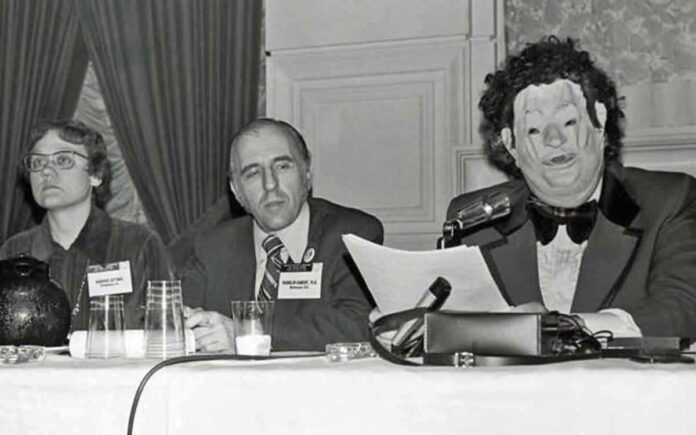
Dr. John Fryer’s contribution to LGBTQ+ history sometimes flies under the radar. Fryer was a gay psychiatrist who fought to have homosexuality removed from the American Psychiatric Association’s (APA) Diagnostic and Statystical Manuel (DSM). May 2, 2022 marks 50 years since Fryer gave his famous anonymous speech to his colleagues at the APA Annual Meeting in 1972, where he wore a mask and spoke through a voice modulator to condemn the classification of homosexuality as a mental disorder. The APA removed homosexuality from the DSM in 1973.
On Monday, May 2, state and local officials will hold the John Fryer National 50th Anniversary Celebration at the John Fryer Historical Marker located at 13th and Locust streets in the Gayborhood. Speakers will include Mayor Jim Kenney, Congressman Dwight Evans and Saul Levin, medical director and CEO of the American Psychiatric Association.
“As we prepare to mark 50 years since Dr. John Fryer’s historic testimony before the [APA] Convention, we should reflect on and recognize the many contributions our LGBTQ+ communities have made to society since his groundbreaking, important work,” Kenney said in a statement. “While we have witnessed great progress over the past five decades, it is clear that there is still much more to do to ensure full equality for our LGBTQ+ community, and I look forward to building on that momentum in the years ahead.”
As part of the celebration, the City of Philadelphia and the Commonwealth of Pennsylvania will issue John Fryer proclamations; the Philadelphia Historical Commission added Fryer’s residence to the Register of Historic Places, and both chambers of the U.S. Congress introduced Dr. John E. Fryer Day resolutions; Rep. Evans introduced the House resolution and Sen. Bob Casey introduced its equivalent in the Senate.
“Dr. Fryer’s courage as the first American psychiatrist to speak publicly about his homosexuality changed the course of LGBTQ history,” Evans said in a press release. “With the APA’s classification reversed, states around the country began repealing discriminatory ‘sodomy’ and anti-gay laws over the following years, clearing the way for millions of Americans to come out and live happier, healthier lives. This momentous change also helped activists and allies to push for the passage of local and state non-discrimination laws.”
Other organizations and entities collaborating on the 50th anniversary celebration are The Association of LGBTQ+ Psychiatrists, the Historical Society of Pennsylvania, Preservation Alliance for Greater Philadelphia, the U.S. Congressional LGBTQ+ Equality Caucus, the William Way LGBT Community Center and Equality Forum.
“I think particularly for anyone who’s under 50 years old, you can’t expect them to realize that in 1972 in most states, you could not be licensed as a psychiatrist, or for that matter, almost anything else if you were a homosexual,” said Equality Forum Executive Director Malcolm Lazin. “That was a moment when being homosexual was considered to be a mental illness and where all but one state criminalized adult consensual same-sex intimacy. Our federal government would not employ a gay person and would discharge any [employee] that they learned was gay.”
Prior to Fryer’s 1972 speech, late gay rights activists Barbara Gittings and Frank Kameny, who were cornerstones of the LGBTQ civil rights movement, staged a demonstration at the 1971 APA meeting, “for the right to be heard,” Lazin said. They realized that if homosexuality remained in the DSM, that they would not get very far in achieving equal rights for queer folks.
Along with forcing the update to the DSM, Fryer’s work had a ripple effect on LGBTQ rights in America. The amendment to the DSM rendered obsolete the archaic practices of “curing” homosexuality via shock therapy, chemical castration, lobotomy and institutionalization. The change also helped to dissolve the foundation of some existing homophobic statutes and regulations, Lazin pointed out.
“This was really the start of helping to change that stereotype and that narrative,” he said. “We’ve made a lot of progress today because people do not view us in that way any longer.”
One such homophobic law that criminalized same-sex intimacy in most U.S. states was repealed in 2003 via the Supreme Court case Lawrence v. Texas. “It really literally underpins our civil rights,” Lazin said. “And if homosexuality was still classified as a mental illness, I doubt that that case would have been won.”
Lawrence v. Texas served as a precedent for the landmark 2013 Supreme Court case U.S. v. Windsor, a case having to do with same-sex marriage in which the court declared that section three of the Defense of Marriage Act, which rejected federal recognition of same-sex marriage, violated a clause of the Fifth Amendment. Two years later, the ruling that resulted from the case Obergefell v. Hodges deemed same-sex marriage legal nation-wide.
Lazin added that in the years following the removal of homosexuality from the DSM, the Association of Gay and Lesbian Psychiatrists (AGLP) was formed, which grew out of the Caucus of Gay, Lesbian and Bisexual Members of the APA. The AGLP later became the Association of LGBTQ+ Psychiatrists, though still goes by its original acronym.
“Here’s a guy who had to be in a mask by virtue of the classification,” Lazin said, “and six years later there were enough gay and lesbian psychiatrists who were willing to openly identify.”
